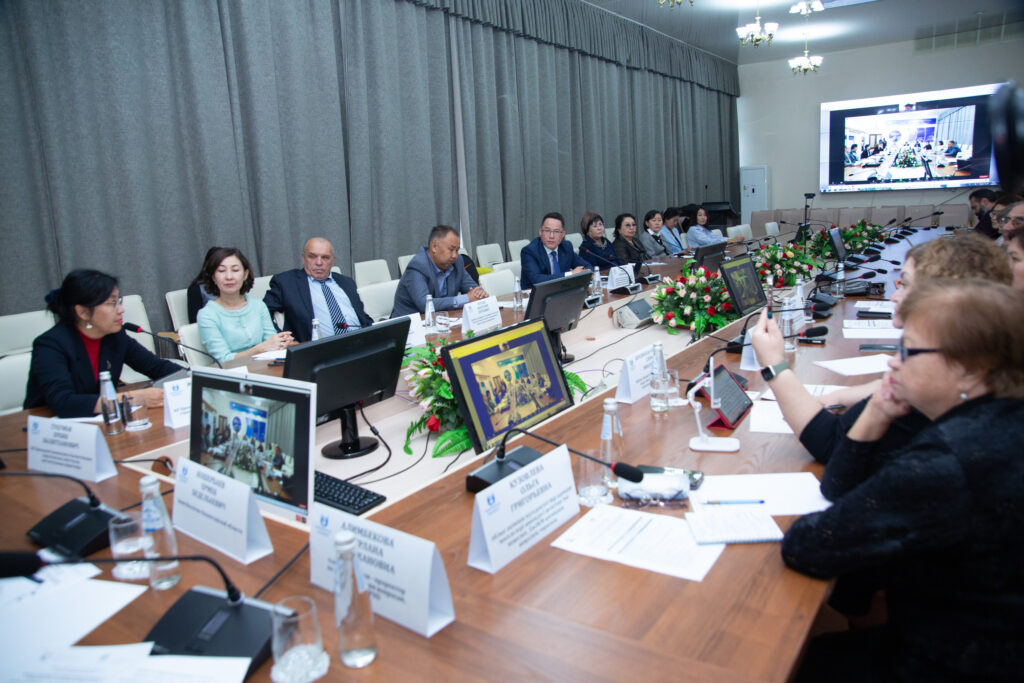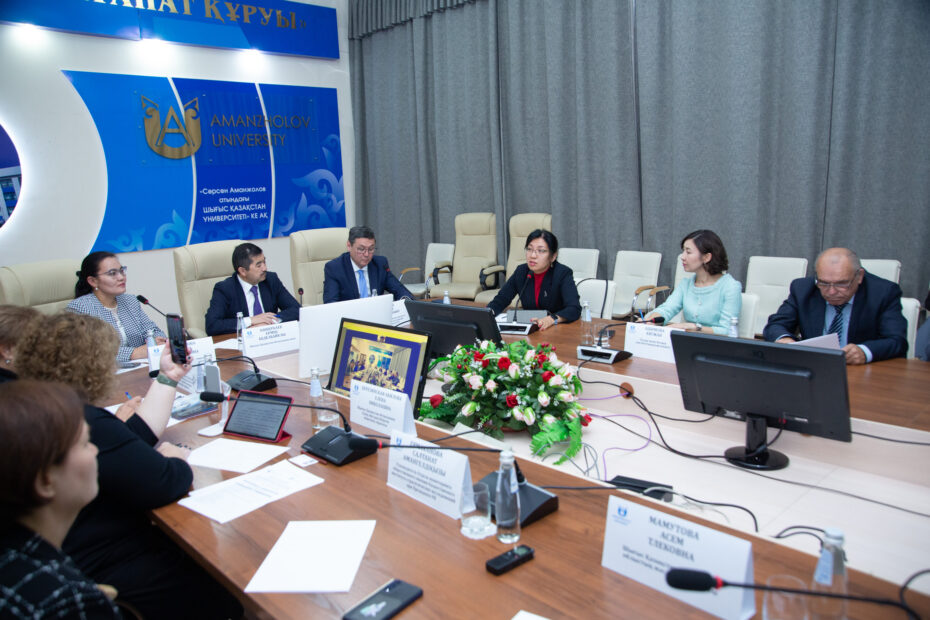Meeting of Kazakhstan Institute for Strategic Studies under the President of the Republic of Kazakhstan experts and representatives of the East Kazakhstan region at the National Expert Platform “KazISS GPS: Gylym. Pikir. Sayasat” was timed to discuss the future of the region in the context of national strategic objectives voiced by the Head of State in his Address. The theme of the session was “Development Prospects of East Kazakhstan Region: main trends and experts’ assessments”. The participants discussed the role of the region in the new economic policy of the country, in particular, in the sectors of tourism, industrial development and processing. These are the areas that constitute the specifics of the region and opportunities for growth and improvement for sustainable development of the region.
During his speech, KazISS Director Yerkin Tukumov said that regional research play a key role in understanding and planning for the future, emphasizing the value of an open dialogue between the capital and the regions. He noted several key aspects that need to be taken into account in the development of East Kazakhstan region. One of them is the rapid growth of urbanization, which can make urban areas more attractive for investment and development, but requires effective management to avoid potential risks associated with population growth.
In addition, Director of KazISS noted the improvement in the material situation of a large part of the population. This demonstrates the economic resilience of the region despite external turbulence. The meeting also highlighted other problems, such as the environment and rising prices, which require attention and comprehensive solutions.
Head of Akim’s Office of East Kazakhstan region Yerbol Nurgaliyev, welcoming the guests, said: “In his Address the Head of State paid special attention to the necessity of providing quality expert-analytical support of the state policy. In the East Kazakhstan region, the executive authorities take measures to conduct sociological research, to establish a constructive dialogue in the region. But we see that there are opportunities for further improvement of this work. That is why we welcome cooperation with KazISS in every possible way. There is a great potential for establishing cooperation between East Kazakhstan University named after Sarsen Amanzholov, Institute of Analysis and Forecasting together with KazISS under the President of the Republic of Kazakhstan. It is very important at today’s discussion platform to identify potential challenges and define areas of work to develop solutions to prevent them”.
Alua Zholdybalina, Head of the Center for Strategic Development of Kazakhstan and Deputy Director at KazISS under the President of Kazakhstan, emphasizes that nowadays it has become obvious that in order to create high-quality analytical materials it is necessary to go beyond desk research, especially in the case of studying the regions: “Often experts onsite better understand regional specifics, know the situation in detail. That is why KazISS actively conducts work on traveling research teams to the regions to make observations and interview local residents. All this is done in order to create a conceptual basis for changing the paradigm of public administration, when the center gives instructions to the regions. We want to strengthen the “voice” of the regions. For this purpose, it is important, among other things, to revise the existing practice of communication between government agencies and citizens. Together we can develop effective solutions to achieve this goal. I think that the down-to-up approach will be more effective.
Yerzhan Domolatov, Director of the Department of Academic Policy and Management of Educational Programs of S. Amanzholov EKU, talked about the project, which is implemented jointly with the Ministry of Higher Education and Science of the Republic of Kazakhstan and East Kazakhstan Technical University: “The main idea is to analyze the socio-economic condition of the region and the sphere of education. The aim of the project is to combine the topic of education with practical skills. It is planned to conduct a survey of employers in the main areas: energy, agriculture, education and tourism within the framework of the research. The directions were chosen according to the principle of the main drivers of socio-economic development. That is, within the framework of the project it is planned to conduct field research as well. The information obtained through in-depth interviews will contribute to the creation of a regional atlas of professions”.
Head of the Institute of Analysis and Forecasting, Ayauzhan Ashimova, emphasizes the importance of interaction and establishing contacts with the regions of the country. She notes that the Institute of Analysis and Forecasting has rich experience in conducting research in all districts of the region: “We actively cooperate and take into account the opinions of civil society representatives in our research, as well as through monitoring of social networks and mass media we receive detailed additional information about the mood of the population, the problems of the region. We are ready to support the initiative of KazISS under the President of the Republic of Kazakhstan, to share our vision of the problems of the region, as well as recommendations. The expert community of the region is competent and has a high level of expertise, and most importantly – ready to cooperate”, – she said.
Olga Kuzovleva, freelance advisor to the Akim of the region on the issues of persons with disabilities, chairman of the Public Council of the MLSPP RK, noted that the problems of citizens with disabilities are not only regional, but also national: “The first is the accessibility of the environment for persons with disabilities, which is currently only partially solved. There is a ramp, but a disabled person cannot move inside the building. The second is the accessibility of the transportation environment. There are seats for disabled people in railroad cars, but the number of seats is limited. The third is invataxis, which are also insufficient. In order to solve the problems of this category of population, it is necessary to work interconnectedly not only with the Ministry of Labor, but also on issues of transport, construction and architecture, education, etc.”.
Yelena Berezinskaya-Abilova, Chairwoman of the Regional Council of Business Women of East Kazakhstan region, touched upon environmental issues: “A coordinated work of government agencies, the public, business and academia is necessary to effectively solve environmental issues. In our region there is a very high level of cooperation between the public and local executive bodies and universities. It is also important to understand the needs of different segments of society. In this regard, it is necessary to pay attention to the realization of the principles of “hearing state”, to conduct constant analysis and monitoring of environmental problems. As an example of cooperation and dialogue, for the first time we held a regional and interregional forum on environmental issues, which brought together representatives of government agencies, akimats and environmental organizations”.
Anatoliy Chursin, Professor of the Department of Geography and Ecology at S. Amanzholov East Kazakhstan University, continued the theme and noted: “Environmental issues remain a priority in our region, and we as specialists actively cooperate with local authorities and NGOs to improve the environmental situation in the region. We actively promote environmental research and continue to develop recommendations. One of our proposals is to change coal burning technologies, which will help to reduce emissions from thermal power plants and private housing sector, which is acceptable for our region.”
The event was attended by representatives of KazISS under the President of the Republic of Kazakhstan, Akim’s Office of East Kazakhstan region, academic staff of Sarsen Amanzholov East Kazakhstan University, the expert community of the region, the state apparatus and the public.
The National Expert Platform “KazISS GPS” held today became a place for constructive discussion of the future of East Kazakhstan region and its role in the development of Kazakhstan as a whole. Experts and university representatives emphasized the importance of cooperation between the state, academic and local expert community to achieve a sustainable and prosperous future.



